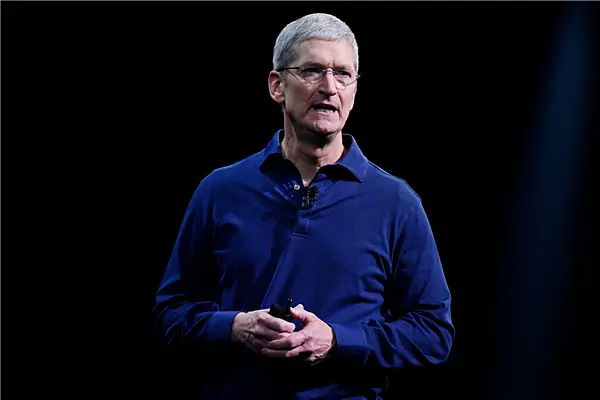Tim Cook: ‘At stake is the data security of hundreds of millions of law-abiding people and setting a dangerous precedent that threatens everyone’s civil liberties.’ Photograph: Bloomberg via Getty Images
(THE GUARDIAN) Apple bossTim Cooktold his employees on Monday that the company’s refusal to cooperate with a US government to unlock an iPhone used by Syed Farook, one of the two shooters in the San Bernardino attack, was a defense of civil liberties.
TheAppleCEO called for the Department of Justice to withdraw its order in an email to staff sent the morning after the FBI director, James Comey, said the company should comply in order to help bring justice to the victims.
“This case is about much more than a single phone or a single investigation, so when we received the government’s order we knew we had to speak out,” Cook said in an email to employees.
Cook’s email – with the subject line: “Thank you for your support” – is the latest salvo inthe public disputebetween the US government andone of the largest companies in the world.
Cook said Apple has “no tolerance or sympathy for terrorists” but that following the Department of Justice’s orders would set a dangerous precedent.
“At stake is the data security of hundreds of millions of law-abiding people and setting a dangerous precedent that threatens everyone’s civil liberties,” Cook said.
On Sunday night, Comey said the order was not about setting a legal precedent, but is instead about providing the victims with a complete investigation.
“We simply want the chance, with a search warrant, to try to guess the terrorist’s passcode without the phone essentially self-destructing and without it taking a decade to guess correctly. That’s it,” Comey wrote in a public letter. “We don’t want to break anyone’s encryption or set a master key loose on the land.”
A federal court in Riverside, California, on Tuesday granted the justice department the order. Apple must respond by Friday to formally protest against the ruling.
Some victims of the attack plan to support the government’s efforts, attorney Stephen Larsontold Reuters.
“They were targeted by terrorists, and they need to know why, how this could happen,” he said.
Larson said he was approached by the justice department last week about representing the victims. He did not specify how many victims he was representing.
Farook and his wife, Tashfeen Malik, carried out the 2 December attack in which 14 people were killed and 22 people were injured.
Apple said it had the technical capability to obey the government’s order, but it was “something we believe is too dangerous to do”.
Cook said if such a system were developed, the company would try to protect it from being released, but it “would be relentlessly attacked by hackers and cybercriminals”.
Cook said: “The only way to guarantee such a powerful tool isn’t abused and doesn’t fall into the wrong hands is to never create it.”
 简体中文
简体中文

